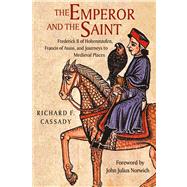
What is included with this book?
The New copy of this book will include any supplemental materials advertised. Please check the title of the book to determine if it should include any access cards, study guides, lab manuals, CDs, etc.
The Used, Rental and eBook copies of this book are not guaranteed to include any supplemental materials. Typically, only the book itself is included. This is true even if the title states it includes any access cards, study guides, lab manuals, CDs, etc.
“The book that you hold in your hands is the biography of a giant: a giant who bestrode late medieval Europe and who is infinitely more deserving of the title Frederick the Great than that pipsqueak king of Prussia on whom it was so unaccountably conferred. That giant’s fluency in six languages—including Arabic—was even rarer in the thirteenth century than it is now; he was a sensitive poet in whose court the sonnet was invented, a generous patron of the arts, a skilled general, a subtle statesman, and a superb naturalist. His book on falconry, De arte venandi con avibus, displays a knowledge and understanding of wildlife probably unparalleled in his time. It was to become a classic and is, I am told, still studied today. Frederick demonstrated his diplomatic skills when he recovered Jerusalem and the holy places for Christendom without shedding a drop of Christian—or Muslim—blood. (It was somehow characteristic of his relations with the papacy that he should have done so while under a papal sentence of excommunication.) A passionate intellectual curiosity—surely inherited from his Norman grandfather, King Roger II of Sicily—gave him more than a passing knowledge of philosophy and astronomy, geometry and algebra, medicine and the physical sciences. No wonder that he should have been given the sobriquet of stupor mundi; he was indeed, in his own highly individual way, a wonder of the world. . . . Being intended—as all really good books should be—not for scholars but for the average intelligent reader, it is, of all those [biographies] that I have mentioned, the most easily accessible. Frederick II was always a lucky man; in his latest biographer he can count himself fortunate indeed.”—from the Foreword by John Julius Norwich